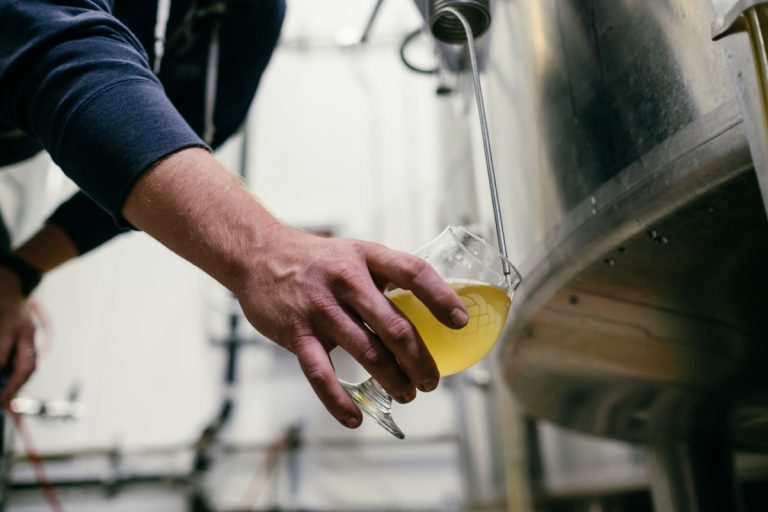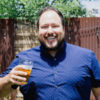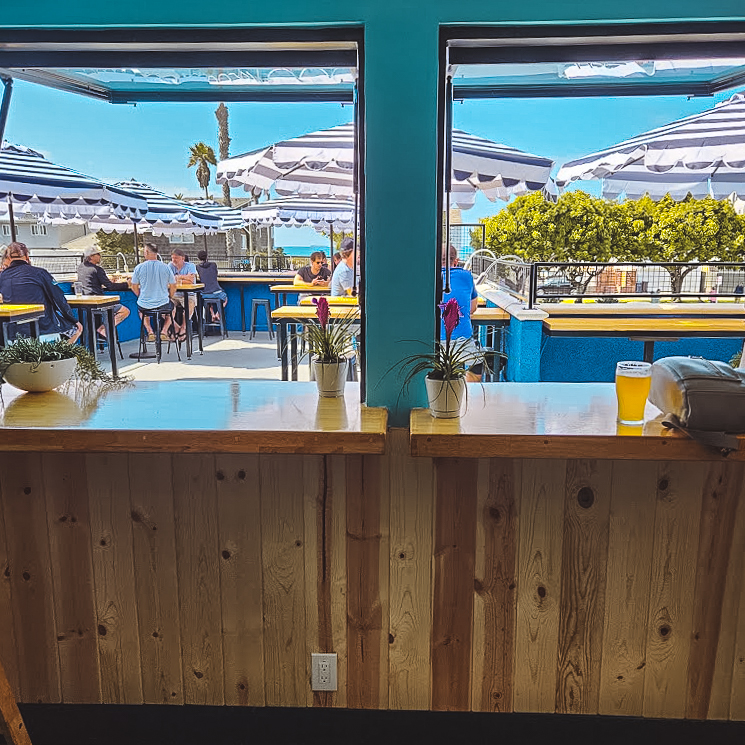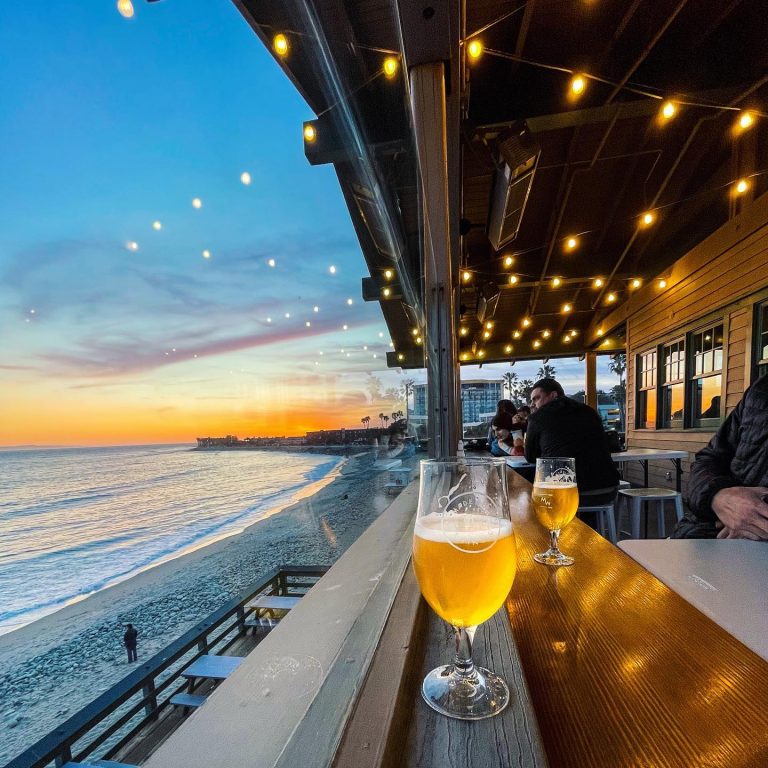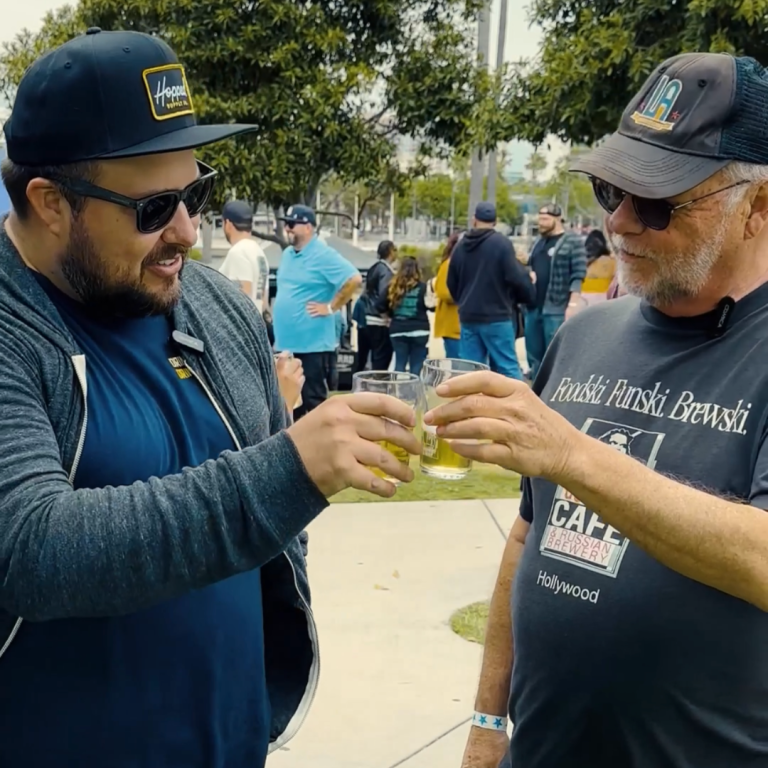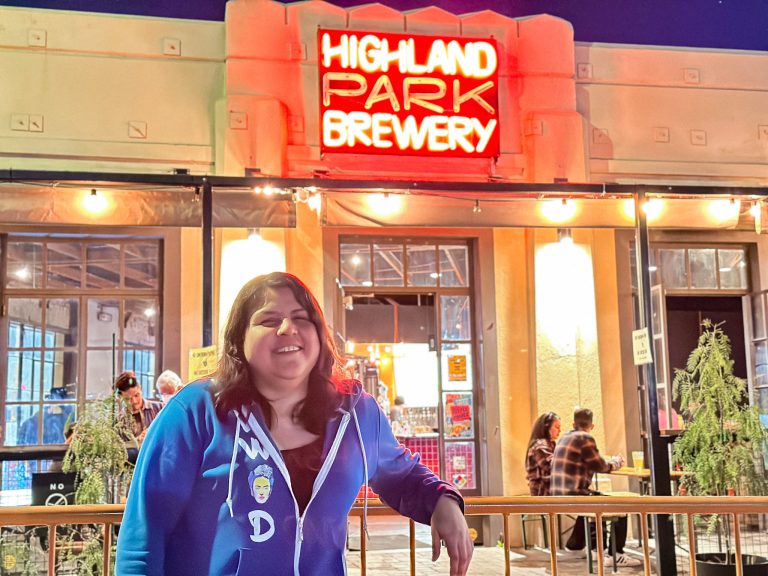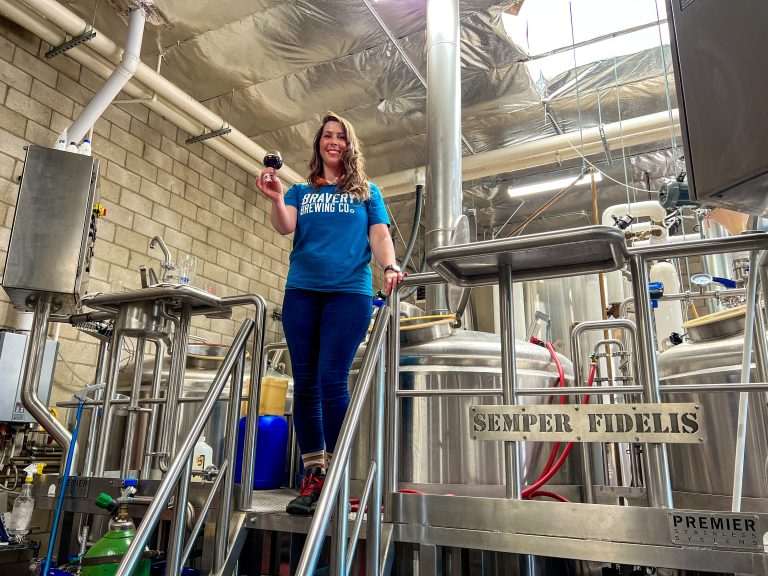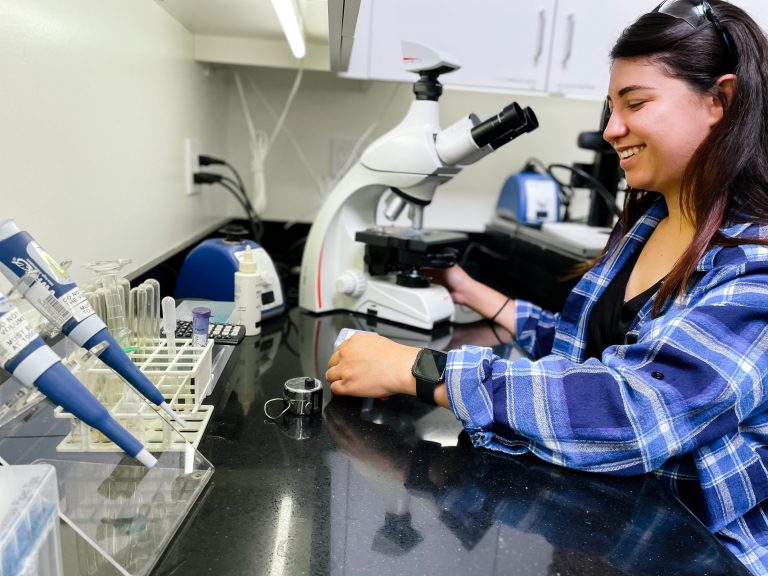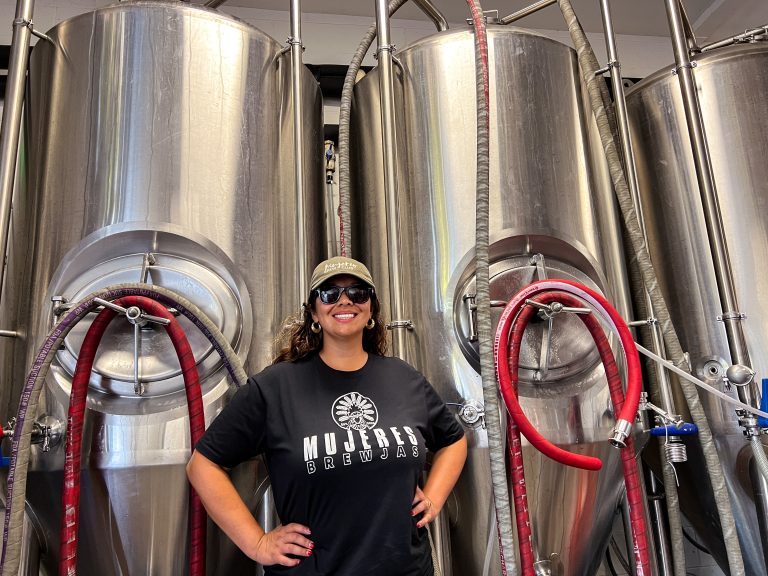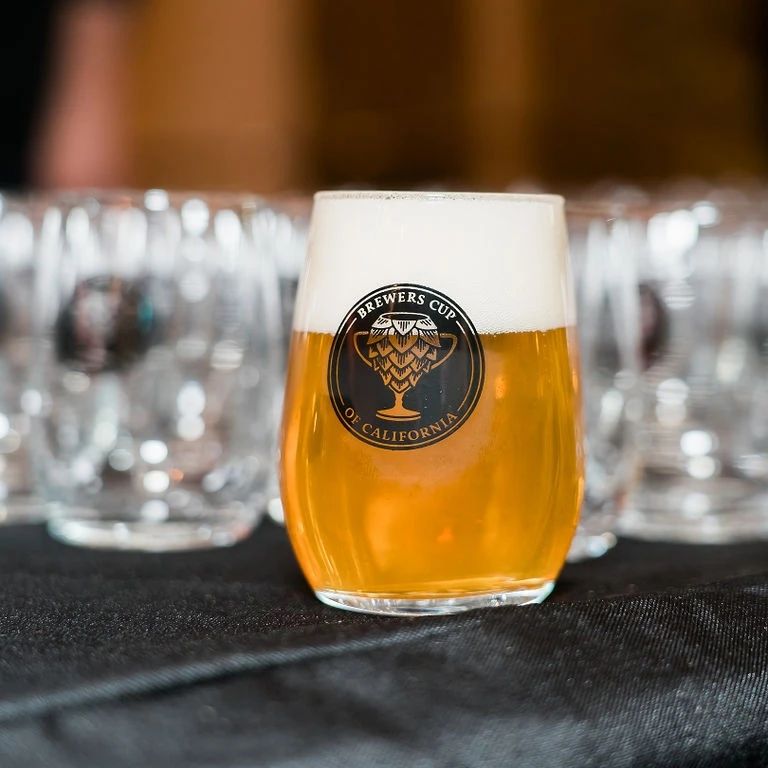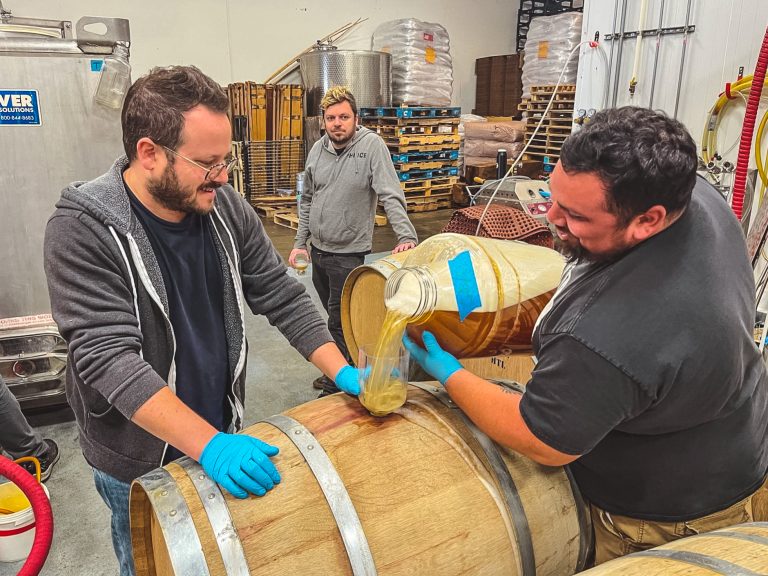We met Amanda Pearce-Smets inside Stereo Brewing’s industrial space in Placentia, laden with music memorabilia and filled with a delicious rotation of craft beer. Amanda is Stereo’s Co-Owner and Operations Director, and the former President of the Orange County Brewers’ Guild. If it doesn’t directly involve brewing operations, Amanda handles it for Stereo; from marketing, hiring, business management, and more.
This interview has been lightly edited for clarity and length.
As told to Mark Smolyar and Cambria Findley-Grubb for Hopped.
HOPPED: How did you first get started in the beer industry?
AMANDA: When I met my husband Rick (Co-Owner and Head Brewer of Stereo Brewing) about 12 years ago, he was already involved in the craft beer industry. We met in line for craft beer at a Bob Dylan concert. So music and beer were meant to be. About seven years ago, we decided to go out on our own and open Stereo. I’ve always had an entrepreneurial spirit and was willing to take risks, so that’s how we ended up with Stereo. Plus, having worked in corporate America, this team is way more awesome than sitting behind a desk all day.

HOPPED: What did you do prior to Stereo?
AMANDA: I’ve had like 100 jobs. I think anyone who worked through college also feels like that. Before we opened Stereo I was at a homebuilding company, which can be a little soul-destroying. I did enjoy my time in the industry, and I learned a lot about business management, but I was really ready to go out and do something on my own.
HOPPED: Was there a light bulb moment of realizing you could use your past work experience and apply it to the beer industry?
AMANDA: No lightbulb moment, just the perfect amount of naivety, moxie, and confidence. In general, I feel like I can figure things out. I think that being willing to take risks and do things that other people won’t is really helpful in opening your own business. It’s just a lot of learning on your feet.

HOPPED: Looking around you can see music everywhere, in addition to the name itself. When you and Rick decided to open Stereo, was there always the intention of having a musical theme?
AMANDA: Yes. When we were daydreaming about opening our own place, we would talk about it in Rick’s little apartment and he has like, 1500 records. Music can be so closely tied to memories. Like, “Oh, I remember this song. I was having this wonderful day.” I feel like the same thing can happen with beer. You can remember what beer you were drinking based on the memory around it.
We knew we wanted to incorporate music into the different elements of the brewery, from marketing, to the taproom, and the playlist we play through the records we spin. At first, we were trying to figure out how we could incorporate music without making it feel like a Hard Rock Cafe. How can we represent music without cliche music notes? We wanted to pay homage to the depths and beauty of what the music that we’re into really is all about.

HOPPED: Do you often find Stereo brews a beer with a song in mind, or do you have a song in mind and brew a beer around it?
AMANDA: It can go both ways. A perfect example is this beer we have called Death of a Ladies Man and it’s a Leonard Cohen album. In the back house, we have a huge sound system in the brew house, and the team was listening to that album every day at the end of the day, and it happened to be right around when we were brewing a beer. So there was definitely some inspiration there. But in terms of the naming, unfortunately, Leonard Cohen passed away right when that beer was released, and it is our bittersweet tribute to his music.
HOPPED: How has the brewery landscape evolved in Orange County during the time you have been running Stereo?

AMANDA: When we were planning on opening, I believe Orange County had around 14 breweries.Now, it’s slowly creeping up on LA County in terms of the number of breweries. I think in some ways things have changed for the better with consumers. They’re more familiar with the brewery experience. It’s not as much of a hard sell to get someone to come drink in a warehouse in an industrial park. We have a lot of breweries, but I don’t think we’re [over]saturated. There are plenty of people to go around. All it does is add to the community.
HOPPED: Did you get involved in the OC Brewers Guild right when you opened?
AMANDA: Oh yeah. Its most recent iteration was taking off as we were planning to open, so it worked out really well. It’s a great way to get to know other breweries. The camaraderie between other breweries is totally there, but you have to put yourself out there a little bit. It’s a very unique experience being a business or brewery owner, or even just working at a brewery, so to find other people that are going through the same thing, that’s one of the things I like about the Guild.
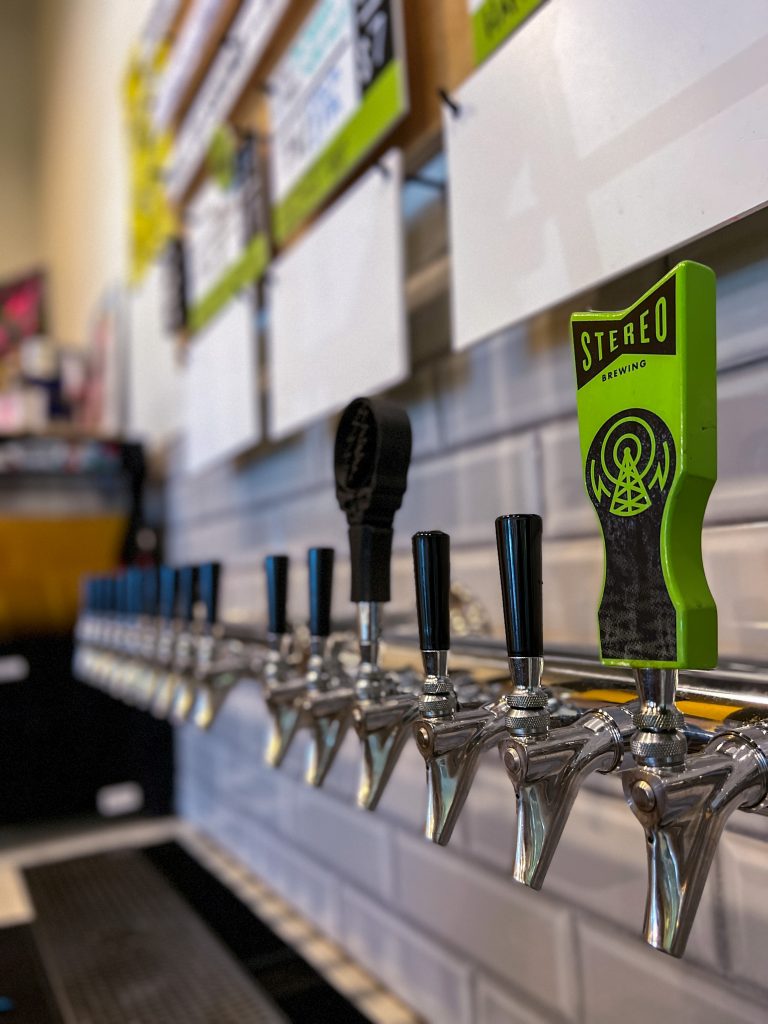
HOPPED: How has being in an industrial park where you don’t have a lot of foot traffic impacted your marketing and how do you get people to come to the brewery?
AMANDA: The way Orange County is zoned, if you need a large production size and don’t want to do food service, the options are pretty much industrial complexes. We do events to draw people in, but chances are we’re not going to get anyone walking in off the street. We have an obscene amount of regulars and I love them all. I think a lot of that is because everyone here has sought out this place and has done it because they have an interest in drinking something local. They want that neighborhood experience, and it makes it more fun for us to be able to provide that.
We are only three minutes from the freeway, but you aren’t going to drive by and see it naturally. Word of mouth is big for us, and that’s why we have always prioritized having a wonderful customer experience. I hire beertenders that like people, like connections, and of course love craft beer.
I can teach you how to wash a glass. I can teach you how to use our point of sale. I can’t teach you to like other people. So that’s what I really look for [in hiring], and I think that’s helped us create an environment where people want to come back which has created a word-of-mouth marketing strategy.
HOPPED: How did you adjust your business plan when the pandemic hit in March 2020?
AMANDA: It made us realize how agile we can be, and changed the way we look at business planning in general. At first, the uncertainty was really hard, but it showed us how to be inventive and showed us how quickly we could execute things. But I don’t want to do it again. For distribution, we have this little 1991 Ford Ranger that still works. That thing has been in like four accidents. It has a ridiculous number of miles. We were delivering beer in the Ranger locally and doing whatever we could to keep getting our beer out there.
And on top of that, the staff was wonderful. They all pulled together, and understood the situation and were with us all the way, which was great. They all came back when we were able to hire everyone back, which I think is a testament to them and our workplace.
HOPPED: So tell us more about the events that you do in the Taproom, things like your Summer Tours.
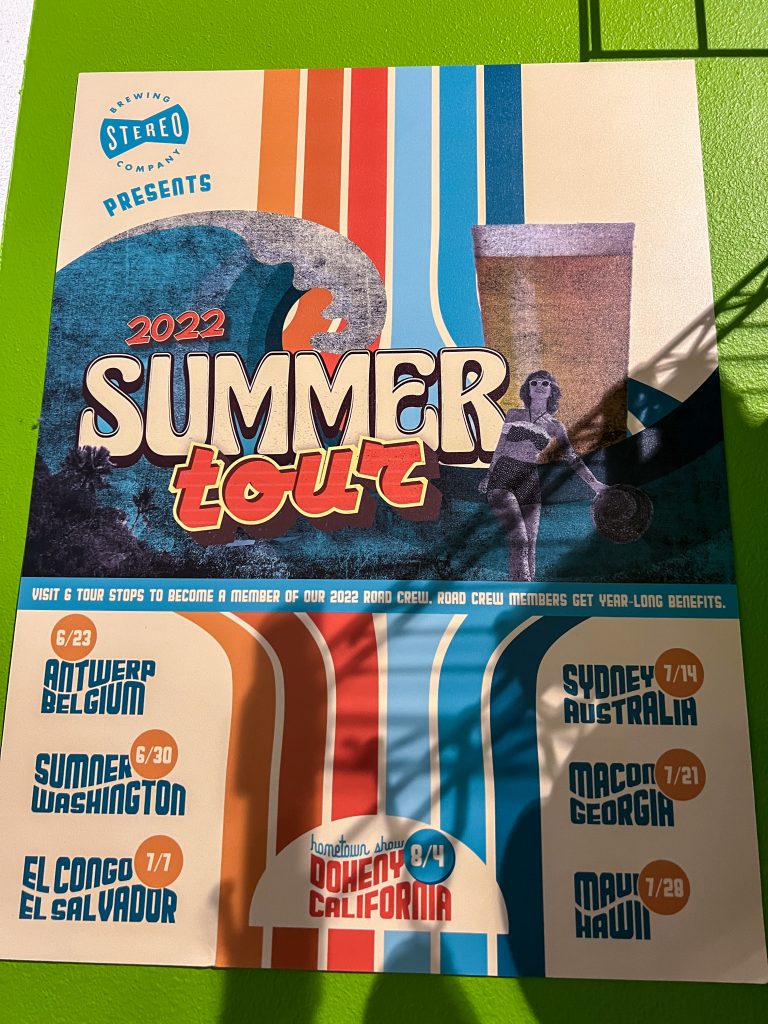
AMANDA: Events are fun. They’re just celebratory and exciting. I mean, who doesn’t like a festive reason to drink beer. But every year in the summer we do Summer Tours where you travel with your taste buds. We release a new beer for 7 weeks in a row, each based on a different destination.
It’s great because our production team and Rick get to experiment with fun styles that we might not get to make big batches of, and it’s fun to see the same people every week for seven weeks who guess what the next beer is going to be. One Summer, we did a summer tracklist in which we released one beer off the tracklist, and at the end it was a whole album.
We have a lot of smaller events too. We just had an emo cover band [and]… a ZZ Top Cover Band which was super fun. We don’t have bands all the time though because if we’re going to be a music venue, we are going to be a music venue and execute that really well, but we don’t have the space to do that. So instead, we think let music venues be the professionals on music, and let’s be the experts on beer. Let’s serve the best beer we can and let’s play some awesome music. You can’t be everything for everybody, and that’s something learned along the way. But we do have some really cool speakers and a sound system in here for spinning records.

HOPPED: What were some of the big lessons that you learned along the way in opening a brewery?
AMANDA: We got married six months after opening Stereo, so I was planning a wedding and the brewery opening at the same time, so that was a lesson in itself. When I first started enjoying craft beer, I think one of the things that was important was leaning into learning. Learning my palate, learning the vocabulary to go along with that, like how can I explain beers? How can I talk about what I’m drinking? And then from there just having the confidence to say what you think. I think a lot of times, it’s easy to be like, Oh, everyone around me knows more than I do. So I’m drinking this, and I get a lot of tangerine flavor, but I’m too embarrassed to say that. But then the second you say it all of a sudden you can start having these really fun conversations about beer with people. So trusting my palate, trusting what I’m smelling and experiencing a beer, and then building the confidence. There’s no wrong answer in how you experience a beer, and I think once I realized that, that everyone wants to hear your experiences too, it was really helpful.
I think the other thing is just taking care of yourself. Decision fatigue is really big. I definitely needed to figure out when to take a step back and handle it tomorrow. Work-life balance did not exist during the first two years.
HOPPED: Do you feel like you and Rick are able to step back and have more work-life balance now?
AMANDA: Yeah, I think preparing for our first child has really helped me to figure out how to empower my staff. Finding wonderful people to be a part of Stereo has helped. Also just knowing when to go home, when to know they’ve got it. The thing is I love being here, and I think it shows. Our staff and regulars play a game where I say am leaving, and people guess when I will actually leave. Like two hours after I said I would leave I am still here. But I think learning to trust other people and when they have got it has helped us now have good balance.
HOPPED: How do you think you and Rick have balanced each other as a husband and wife team?
AMANDA: Rick is the more artistic type and I’m more of the nuts and bolts planner. When we were first planning on opening, my 90-year-old grandfather told me to my face we were never going to open a brewery. On the very first day of brewing, he was eating his words, sitting in a lawn chair and watching us brew. And on that first day, I already knew what I was ordering for lunch because we literally had an audience.
And as we are headed to the brewery [that day]… I ask Rick “What’s the recipe?” and he is like “I’ve got it in here. It’s all in my head.” And when we got to the taproom he took 8 minutes to write it down, and it was amazing. Just a really good classic West Coast style pale ale. It’s like music, when the inspiration hits, it hits. He takes more time for recipe development nowadays, but I think that goes to show the difference between my Type A planning and Rick’s artistic side. Now we have won five medals in five years at Great American Beer Fest, which is fun to say.
HOPPED: What is the story behind your design around the brewery?
AMANDA: We partner with different designers and artists, and I don’t like to give artists a lot of boundaries. So we’ve had a really fun time working with different designers and sharing our vibe, then having them put their spin on it. Behind me, you will see our different posters for each of our years, and the spins different artists have put on it. In one of our posters, there is a little distortion, and the artist actually has an old-school digital scanner and moved them on the scanner in the middle of scanning.
There was one of our regulars who was coming here all the time to enjoy beer sitting at the bar, and he was a big fan of our Imperial Red Ale, The Robot, which is a big fan favorite. He was like “I think I could do a really cool art piece for that,” and was like “I didn’t know you could draw, but okay,” and we worked out a price at $300. Either it is going to be the best $300 I have spent, or I will get a story out of it. So about two weeks later he walks in with the robot. I think he did it in watercolor and we worked with another designer to make it into something we could screenprint.

HOPPED: What advice do you have for women who are interested in working in the beer industry?
AMANDA: I think there’s a ton of space for women and beer. It may be male-dominated, but don’t let it discourage you, and don’t let it intimidate you. You know more than you think you know. You are allowed to make mistakes and ask questions. Also, find other people, men or women in the industry doing something you aspire to do, and don’t be afraid to reach out to them. I’m very lucky that most of the people I met in the industry were welcoming and couldn’t wait to either learn, teach me more, or support my learning.
HOPPED: What should we keep a look out for from Stereo over the next year?
AMANDA: One thing is a permanent outdoor patio space. Consumer habits have changed and people want to eat outside, so we are looking at having a really nice dedicated patio. You will no longer be drinking under an umbrella.
We’re growing in the LA market, [too]. I [also] daydream of strapping the kid to me and pouring beer with a little baby on. On September 17th, it’s Oktoberfest, and that’s going to be my first day back in person, so definitely come out for Oktoberfest. We’re bringing in a band … I’m talking brass, I’m talking accordion. We’re also making two German-style beers, so that’s the next event I am really excited about.

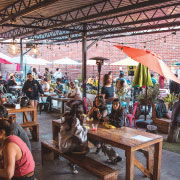
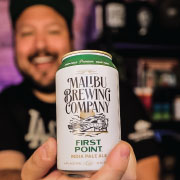
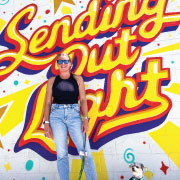
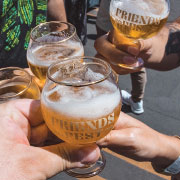
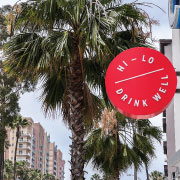
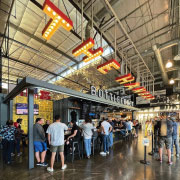
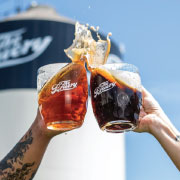
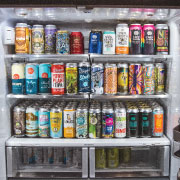
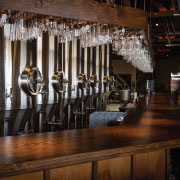
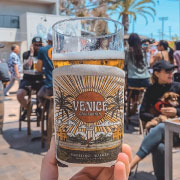
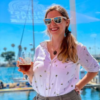 Cambria Findley-Grubb
Cambria Findley-Grubb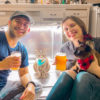 Mark Smolyar
Mark Smolyar
